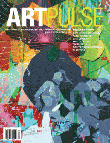« Reviews
Carlos Motta: Histories for the Future
Pérez Art Museum - Miami
Curated by María Elena Ortiz
By Raisa Clavijo
At Pérez Art Museum, New York-based Carlos Motta (Bogota, 1978) presents an exhibition through which he explores extremely contradictory positions about sexuality and eroticism in indigenous and European cultures during the conquest and colonization of Latin America. His research addresses the way in which different ethnic groups in the Americas came to terms with homosexuality and the question of gender before the arrival of the Europeans and how these roles changed as Western doctrines were established. His oeuvre revisits the aftermath of the conquest of the New World, offering a totally new cartography that shines a light on appalling stories, which have been erased from official history and denounce violence and intolerance, attitudes that still prevail today in the 21st century.
During the Inquisition, thousands of people were put to death both in Europe and its American colonies, accused of crimes against religious mandates. Notable amongst these “crimes” were sodomy, masturbation and zoophilia, which contravened sexual practices considered traditional. Motta reexamines colonialism, which destroyed indigenous cultures and beliefs, replacing them with orthodox morality anchored in Catholicism. The first piece in the exhibition, Towards a Homoerotic Historiography, presents 20 small, gold-plated sculptures arranged as a traditional museographic setting at a museum of history. Each of them re-creates a pre-Hispanic artifact representing a sexual act (most between members of the same sex) not accepted during the Colonial period. The artifacts were discovered in archeological excavations in Latin America. In reproducing them and re-circulating them in this exhibition, Motta creates a space for reinterpreting these vestiges that in most cases were erased from the material history of this region.

Carlos Motta, Deseos (Desires) (still), 2015. Courtesy Galeria Filomena Soares, Lisbon and Galerie Mor Charpentier, Paris.
For its part, the Nefandus Trilogy (2013) includes three videos (Nefandus, Naufragios (Shipwreck) and La visión de los vencidos (The Defeated), each inspired by a real event. Nefandus and La visión de los vencidos have as a backdrop the Colombian Caribbean and are based on pre-Hispanic oral histories. A narrator recounts the relevant history in Kogi (Amerindian language, spoken only by the natives of the Sierra Nevada de Santa Marta). In Nefandus, the narrator alludes to a passageway in which the conquistadors found objects that represented homoerotic relations. Fragments in Kogi are juxtaposed with other fragments in which Motta in Spanish establishes a transhistorical dialogue with the narrator and through which he reflects on the structure of sexuality and its categorization relative to culture, history and the process of colonization. La visión de los vencidos describes a masculine ritual that ended in a massacre when the conquistadors discovered that it included sexual contact. Naufragios is an adaptation of the text “Misadventures of a Sodomite Exiled in 17th century Bahia,” as told by the anthropologist Luiz Mott. The video describes the life of Luiz Delgado, a Portuguese man accused of sodomy in the 17th century in Portugal and Brazil. The video reproduces the imaginary voice of Delgado recounting how he was tortured for the sin of sodomy and how he managed to survive. The video shows a map of the Portuguese colonies on which Motta has attempted to trace new cartographies in order to make room for voices such as that of Delgado, which was silenced during the Inquisition.
The fourth film shown, Deseos (2015), brings to light the story of Martina Parra, a Colombian woman who in 1803 was accused by her lover, Juana María, of being a hermaphrodite. Motta discovered Martina’s case while doing research in the Archivo General de la Nación (National Archives) in Bogota. Martina was subjected to a trial and analyzed by doctors and lawyers to determine the gravity of her offense. Hidden in the archives, her story bears witness to the oppression that human beings have had to confront as a result of laws and strict Catholic morality. In Deseos, her story connects to that of Nour, a woman residing in Ottoman Beirut who was forced to marry her lover’s brother in order to “rectify” her sexual conduct. Through a hypothetical epistolary exchange between Martina and Nour, Motta and the anthropologist Maya Mikdashi make note of the relevance to the battles for sexual emancipation and freedom in contemporary society.
In this exhibition, Motta undertakes a revision of history, relying as much on documentary research as on fiction to create new narratives that reflect on the plural nature of sexual identity in contrast to the totalitarianism that has known no time constraints or geographic bounds as civilization has evolved.
(July 15, 2016 - January 15, 2017)
Filed Under: Reviews



































Leave a Reply
You must be logged in to post a comment.